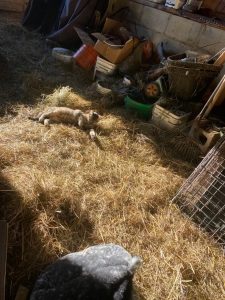Muskoka Animal Rescue has helped hundreds of animals since its founding in 2008, and now, the team at the rescue is looking for foster families and feral cat placements to continue improving the lives of companion animals across Muskoka and Parry Sound.
Muskoka Animal Rescue primarily works with cats and dogs, but they’ve also taken in guinea pigs, bunnies and even some reptiles over the years. The rescue is run entirely by volunteers and is funded by adoption fees and donations alone. Managing coordinator Sue Hummel started volunteering with the rescue after adopting one of their dogs. She got to know the team throughout the adoption process and became a foster before taking on a larger role in the rescue in 2015. Hummel and the other volunteers have worked hard to keep up with adoptions even as the pandemic disrupted their fundraising efforts and complicated the adoption process.
“There was a period of time where anytime we would post a cat or kitten for adoption, we would get an insane number of applications,” Hummel said. “People were really keen to adopt. It’s slowed down a little bit, but if we post new kittens or new cats or whatever, we get a fair amount of interest right away.”
When the pandemic first hit, the rescue paused adoptions and later transitioned to a contactless adoption process. The team continues to perform home visits virtually and alongside finding new adoptive families, the rescue is seeking homes for their feral cats.
The rescue runs a feral cat program that includes trap-neuter-release efforts to help manage feral cat populations as well as rehoming for cats from unsafe areas.
“The best thing for a feral cat, really and truly, is for it to go back to where it was trapped. It’s not always possible for various reasons,” Hummel said. “It could be a dangerous location near a busy road, but a lot of times, it’s just that there isn’t somebody there that is willing to take on the responsibility of being a feral cat caretaker.”

In those cases, the rescue locates safe places like barns, heated workshops and similar spaces for the cats to live, be taken care of and contribute as pest control. Trapping slows down in the winter for the safety of the cats involved, so the rescue is working hard to trap and vet feral cats as the weather grows colder, and finding homes is an essential part of the process. They always place feral cats in pairs or threes and they have five cats already looking for a home.
Along with a warm space and a caretaker to provide food, the ideal feral cat placements offer a space to keep the cats contained while they get used to the scents, sounds and food supply of their new home. Simply letting cats go in a new environment can cause them to leave in an attempt to find their original territory, Hummel said, so it’s important that they have some time to get more comfortable in their new surroundings.
“Especially with barns, if they’re open to the air, there’s always a chance that a feral cat will not stick around, so we really do try to set them up for success,” she said.
In addition to feral cat homes, the team at the rescue is looking to find more foster families for their animals. As a completely foster-based operation, the rescue has no shelter, so they’re only able to take in animals if they have available fosters.
“We have a real need for people that are able to take adult [cats],” Hummel said. “Everybody wants to foster kittens, kittens are fun, but when we have adult cats where people are sort of in a desperate situation or there’s a problem, something’s not working out at home or they’re moving etc., we have very limited adult cat foster homes.”
The rescue could always use more volunteers as well, especially to help with screening potential homes and transporting animals for vet care. For those who want to help the rescue but can’t volunteer or foster, financial donations and gift cards for animal supplies are vital to the rescue’s operations.
The rescue has taken in over a hundred pets a year for as long as Hummel’s been involved in administration. They’re on track to help more animals this year than ever before with about 130 adoptions so far and around 60 feral cats already fixed, so from fosters and feral cat homes to adoptions and donations, any support for Muskoka Animal Rescue helps cats, dogs and other critters across the region.
For more information on Muskoka Animal Rescue, visit their website. To adopt one of their animals (see a few of their cats below) or to offer feral cats a home, contact info@muskokaanimalrescue.com.











